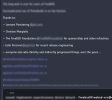Microsoft used to be a competitor of open source. It did what all competitors do: try to overtake and damage the competition. It did exactly the same thing to Digital Research, IBM, Borland, Sun, Oracle, Google and Apple.1. Microsoft is an ENEMY OF THE FREE SOFTWARE movement and I love the FreeSoftware movement.
Today Microsoft is a huge consumer of open source; it is probably the company with the 3rd largest number of Linux computers in the world (after Amazon and Google). It has understood that there is more value in using and leveraging open source than in trying to outrun or squash it.
Who is our friend? Do we have any friend between companies? Well, one sure i know is Google, it gives a LOT of resources to many FreeSoftware projects not directly tied to its immediate consumption.
Google is an even larger consumer of open source. Again, using the simple count of Linux instances, it has more than Microsoft (and that's really saying something!). But if you look at total funding going into Open Source (most of which goes into Linux, and the ecosystem around it), Google is not particularly large. Intel and IBM contribute more.
None of these companies are friends of open source. They are users of it, and in some cases (such as Intel) they have a symbiotic relationship with it. They know how to make smart investments.
The vast majority of all Linux machines on the planet (probably about 99%) are in data centers, being used as servers. They are there because their users (who typically spend B$ per year on computers) look at total cost of ownership; they don't care whether Windows stinks or not: if it were cost-effective, they would use it.1.3 Why Microsoft is enemy of the FreeSoftware movement? That is pretty easy, what pushes/pushed the majority to Linux or BSD ? That fact that Windows strinks!
Ignoring servers: The use of Linux (and other free OSes, which are much smaller) as personal desktop/laptop machine is (a) much smaller than their usage as servers, and (b) much smaller than the usage of Windows on personal machines. You have to remember: Windows and MacOS together have about 90% market share on desktop/laptop machines! Even ChromeOS (an operating system without an operating system, as most people really just run Chrome on it) has a market share about as high as Linux!
So if Windows stinks, please explain why it is still the undisputed #1 in personal OS usage, with the Mac as #2, and everybody else far behind. Answer: It doesn't stink. To about 75% of all people who make the decision which OS to buy, a Microsoft product is the best answer.
It is true that Microsoft has a near monopoly on the personal desktop/laptop OS market. But it is by far not the only monopolist in the computer industry. Linux has a near monopoly on the server OS market, and a 100% monopoly on the supercomputer OS market (look at the TOP500 list: every single of the 500 largest supercomputers in the world runs Linux). Google has a near monopoly in the search market. The market for commercial databases is not exactly a monopoly, more of a duopoly: between Oracle and IBM, it is pretty sowed up. If you look at Cloud, Amazon doesn't have a monopoly, but it is so much larger than any competitor (about twice Microsoft, 3x Google, and nearly 10x than any other competitor) that one really can't describe that market as a "level playing field". I can go on and on: If you want an enterprise tape drive, the heads will be manufactured by IBM, and the drive and library either by StorageTek (now a division of Oracle) or IBM. In disk drives, there are about 2.2 vendors left. The computer market is full of monopolies and near-monopolies. There are many reasons for that, too hard to explain here.3. Microsoft is a de facto MONOPOLIST, as such, ...
I like the way Esther Dyson explains it (about 25 years ago, when Microsoft's position was far stronger than it is today): Microsoft is not a dictator, it was democratically elected by computer users. The only problem is that the constitution of the computer world only allows for a single election. In reality, what happened in the intervening years: the Internet, and the movement of computers from personally owned single-user machines to fractionated servers in the cloud has really disrupted Microsoft; what is left to it is a near-monopoly on the desktop OS. In all other fields, it is a competitor, but so are many other companies.


